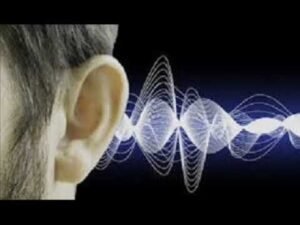Medical Mysteries: Sudden hearing loss in one ear was no minor irritant
As he picked up the phone to make the call, Wayne Curtis worried that his doctor might think he was a hypochondriac.
Three weeks earlier, Curtis, then 48, had consulted Baltimore internist Charles Locke about a pulled muscle.
Now the real estate agent had a new and seemingly trivial complaint: He couldn’t hear anything out of his left ear,
which seemed blocked. Curtis assumed that his problem was related to the thick coating of tree pollen that blanketed his downtown Baltimore neighborhood.

Normally Curtis, who has long battled spring allergies, would have toughed it out and waited several weeks to see if his hearing returned as the pollen counts dropped. But a newly formed choral quartet of which Curtis was a member was about to have its first concert, and the tenor, who has performed with the Boston Symphony Orchestra, was concerned that his impaired hearing was affecting his singing.
“I expected him to put me on a stronger decongestant, not to tell me to come in the very next day,” said
Curtis, who was taken aback by Locke’s emphatic response.
“It’s probably a classic case of ‘It’s better to be lucky than good,’ ” Locke quipped. His sense of urgency was fueled by a memorable patient he had seen more than a decade earlier….
Read more: Lessen the intrusiveness of your tinnitus exercise
…….
* * *
Curtis’s season of misery was as perennial as the pollen, and he was accustomed to loading up on antihistamines and decongestants every spring to get through it.
The morning in April 2009 when he woke up and suddenly realized he couldn’t hear anything out of his left ear seemed like just another manifestation of his severe allergies. He felt the same sensation experienced by an airline passenger before his ear pops as the altitude changes.
“I kept expecting it to pop, but it never did,” Curtis said, “but there was no pain so I didn’t worry about it.” He knew he hadn’t injured his ear or done anything unusual, so he figured it would clear up on its own. Several days passed, and during rehearsals for the upcoming concert, Curtis became aware of a new and bothersome symptom: loud static or “white noise” in that ear.
Five days after he first noticed the problem and the day after the phone call, Curtis sat in Locke’s office, describing his condition as the doctor listened intently. He had no headaches or dizziness, he told Locke, and the hearing in his right ear seemed normal. Locke peered into Curtis’s ear and tested his hearing using a
tuning fork. The tests revealed that Curtis was virtually deaf in his left ear and that the problem appeared to be located in the inner ear.
At that point, Locke recounted, he was fairly certain what was wrong: Curtis was suffering from idiopathic sudden sensorineural hearing loss — sudden deafness in one ear, which affects between five and 20 people per 100,000 annually.
Unlike conductive hearing loss, which affects the outer ear, sudden sensorineural hearing loss is an urgent medical problem that can range in severity from mild to profound. Curtis’s was so severe it could have left him permanently and totally deaf in one ear. In most cases, including Curtis’s, the cause is unknown; treatment with corticosteroids has demonstrated success in some patients.
Curtis was stunned, particularly after Locke described the first case he had seen, which left an indelible impression.
Soon after finishing his residency in 1996, Locke saw a patient who told him that 20 years earlier she had woken up unable to hear anything in one ear; her hearing never returned and Locke does not know if she sought treatment. Locke treated her for a seemingly minor problem in her good ear; two days later she was back in his office, unable to hear out of that ear and now completely deaf.
“Obviously this was quite dramatic, and we were able to get her an immediate appointment with an ear, nose and throat specialist,” Locke said, adding that treatment restored hearing in the second ear. The ENT later told Locke that some patients suffer permanent deafness as a result of delays in diagnosis and treatment of sudden sensorineural hearing loss. Often they or their physicians mistakenly attribute the problem to allergies or respiratory congestion from a cold.
--> Download article to continue reading